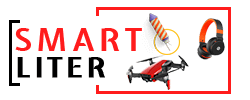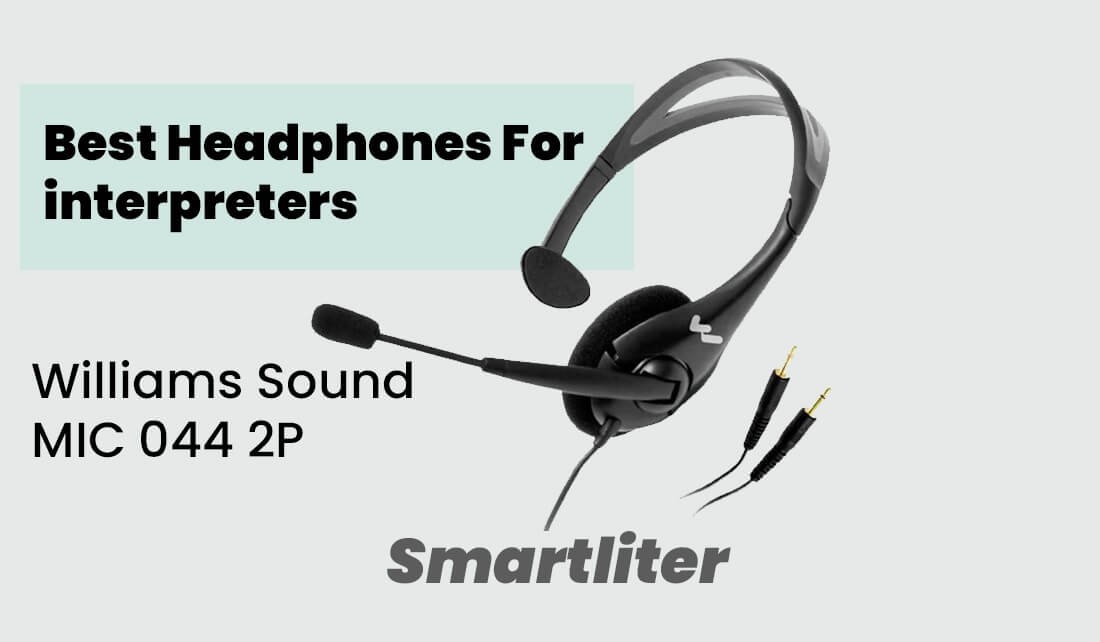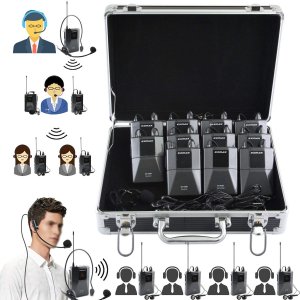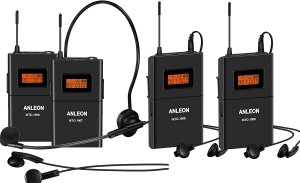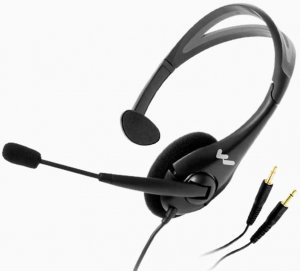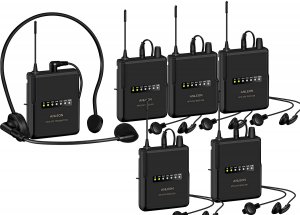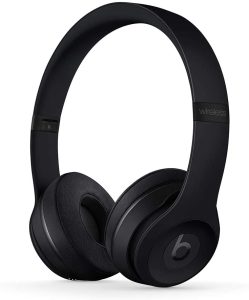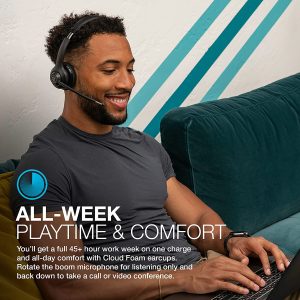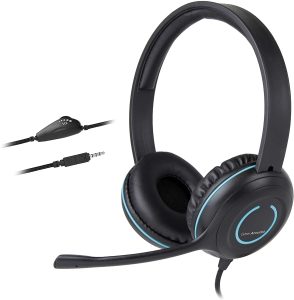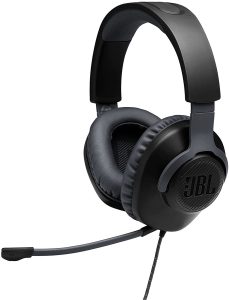The market for headphones has grown rapidly in the past few years. As a result, there is a wide range of headphones available, from headphones for music to headphones for gaming, to even headphones for phone calls.
There are many benefits of using headphones, but it is certainly the best because it can help improve our concentration and focus by taking away outside sounds.
Best Headphones For interpreters
If you’re looking for the best headphones for interpreters, then this article is for you. These headsets have all been tested to ensure they are suitable for interpreters participating in multilingual conferences on ZipDX.
Simple to use and has a clear sound. An excellent value for a simple and good product. We have listed four products that are the best quality headphones for interpreters.
1: Headset Microphone Tour Guide
Brand
EXMAX
Noise Control
Sound Isolation
Connectivity Technology
Auxiliary
Form Factor
Over Ear
Operating Range
150M / 492 Feet
Transmitter Weight
66g/2.33oz
Receiver Weight
66g/2.33oz
Receiver Playtime
15Hrs
Communication Distance is 150 meters
Using Exmax EX-938 UHF wireless voice audio transmission, people who wear earphones of the receivers can hear the voice expressed through the transmitter’s microphone. The distance of the communication is 150 meters/492 feet.
More Features
The EXMAX EX-938 meets the requirements for simultaneous interpretation, church translation, audio tour guides, social distancing solutions, assisted listening devices, wireless voice transmissions.
It requires a human interpreter
Interpretation headsets by overcoming noise and distance issues and ensuring your message are heard clearly—best headphones for interpreters. It does not translate automatically. It requires a human interpreter.
Battery
Low power consumption design for extended working time over 15 hours. And easy operation on battery replacement. Even from 328 feet/100 meters away, you can hear the EX-938 wireless audio voice transmission system.
2: Wireless Tour Guide Language Interpretation
Brand
ANLEON
Model Name
MTG-100 650-680
Noise Control
Active Noise Cancellation
Weight
1.98 pounds
Operating Range
>100m
In this case, the presenter uses a radio microphone transmitter, and the audience uses lightweight receivers to hear the message. As a result, it excels at ease with professional features. In addition, they are operating in an ISM band without a license.
User License
User licensing is not required for ISM band, long battery life up to 26 hours, low power consumption. However, rather than automatically translating, this system relies on a human language interpreter—the best headphones for interpreters.
Message Can be transmitted to a large audience
A simple audio system for visitor guidance, conference presentations, and assistive listening, Tourguide MTG-100 is the right choice. An audio message can be transmitted to a large audience via the MTG100, a portable short-range wireless system.
3: Noise-Cancelling headphones for interpreter
Weight
0.19 lbs
Plug
2 x 3.5 mm
Phantom Powered
No
Replacement Earpad
EAR 035
Replacement Windscreen
WND 008
Earphone Sensitivity
105 dB @ 1 kHz
Freq. Response
150 - 18 kHz
Connectivity technologies
Wired
Special Features
Microphone, Noise-Canceling
When choosing the best headphones for interpreters, it is important to look at a few different factors. When selecting the headphones for interpreting, the first thing that you will need to consider is the level of noise cancellation that you want in your headphones.
Noise cancellation is a feature that will allow you to focus on the message. These are the best headphones that you should buy.
4: ANLEON MTG-200 Wireless Tour Guide
Brand
ANLEON
Power Source
Battery Powered
Item Weight
1 Kilograms
Hardware Platform
PC
Number of Channels
6
Warranty
24-month warranty
license requirements?
Customers are satisfied with the sound quality, and Everything worked perfectly. There are no license requirements for this spectrum. Users do not need a license to use the ISM band.
30 hours of playback.
This device does not translate automatically, and a human language interpreter is required—a low power consumption design for up to 30 hours of playback. The ability to add users is always available.
5: Jabra Evolve 65 UC Stereo Wireless Bluetooth Headset for interpreters
| Brand | Jabra |
| Color | Stereo Speaker |
| Connectivity Technology | Wireless |
| Model Name | Evolve 65 UC – SME |
| Form Factor | Over Ear |
Are you looking for a high-quality headset to use while interpreting on conference calls or while working with clients? Look no further than the Jabra Evolve 65 UC Stereo Wireless Bluetooth Headset!
This headset offers crystal clear sound quality and the ability to pair wirelessly with your computer, mobile phone, or tablet. It also features specially designed noise-canceling microphones that help to block out distracting background noises. With an adjustable headband and flexible microphone boom arm, this headset is incredibly comfortable to wear for long periods of time.
6: Beats Solo3 Wireless On-Ear Headphones for interpreters
| Brand | Beats |
| Ear Placement | On Ear |
| Color | Black |
| Connectivity Technology | Wireless |
| Model Name | Beats Solo3 |
Interpreters need to be able to hear clearly in order to do their job properly. That’s why Beats Solo3 Wireless On-Ear Headphones are a great choice for those in the interpreting field. With clear sound quality and noise isolation, these headphones will help you focus on your work and deliver accurate interpretations. They’re also comfortable to wear, so you can wear them all day without feeling weighed down.
Plus, they’re wireless, so you can move around freely while you work. If you’re looking for a great pair of headphones to use while interpreting, the Beats Solo3 Wireless On-Ear Headphones are a great choice.
7: JLab Go Work Wireless On-Ear Headphones with Boom Mic for interpreters
| Brand | JLab |
| Color | Black |
| Connectivity Technology | Wireless, Wired |
| Form Factor | On Ear |
| Headphones Jack | 3.5mm Jack |
If you’re an interpreter, then you know how important it is to be able to hear clearly. But sometimes, background noise can make it difficult to understand what’s being said. That’s where the JLab Go Work Wireless On-Ear Headphones with Boom Mic comes in handy. These headphones feature Active Noise Cancellation (ANC), which blocks out unwanted noise so you can focus on the interpretation. The boom mic also helps to ensure that you’re hearing everything clearly, and it’s adjustable so you can get the perfect fit. Plus, the wireless design means you don’t have to worry about tangled cords getting in the way.
8: Cyber Acoustics 3.5mm Stereo Headset with Headphones for interpreters
| Brand | Cyber Acoustics |
| Connectivity Technology | Wired |
| Form Factor | On Ear |
| Headphones Jack | 3.5mm Jack |
| Item Weight | 0.3 Pounds |
This headset from Cyber Acoustics is a great choice for interpreters. The 3.5mm stereo connection ensures compatibility with most interpreting equipment, while the headphones offer clear sound quality. The comfortable headband and ear cups make it easy to wear for long periods of time, even during extended interpretation sessions. Additionally, the lightweight design means you can move freely, whether you’re walking and gesturing during a conference or moving around a courtroom.
9: JBL Quantum 100 - Wired Over-Ear Gaming Headphones for interpreters
| Brand | JBL |
| Color | Black |
| Connectivity Technology | Wired, 3.5mm |
| Model Name | JBL Quantum 100 – Black |
| Form Factor | Over Ear |
Looking for a for interpreter headset that has great sound quality and a comfortable fit? Look no further than JBL’s Quantum 100 over-ear wired headphones. With large 50mm drivers, these headphones produce deep bass tones and crisp treble sounds with minimal distortion. They’re also completely wireless, so you can enjoy your favorite games without cables getting in the way. And thanks to their ergonomic design, they’ll stay comfortable even during long gaming sessions.
So if you’re looking for a great pair of interpreter headphones that won’t break the bank, the JBL Quantum 100 are a perfect choice.
Why should you consider becoming an interpreter?
Interpreters use various skills to convert one language into another. Good fit for those with an expansive vocabulary in two different languages and enjoy working closely with many people across cultures.
The best interpreters must be able to translate and understand precisely what words mean so they can convey them without any confusion or error on either end of the conversation.
What languages are in Demand For interpreters?
- French
- Spanish
- Portuguese
- Simplified Chinese
- German
- Korean
- Canadian French
- Arabic
What is the hourly rate for interpreter?
$21.34 an hour
Annual Salary
Weekly Pay
Top Earners
$96,000
$1,846
75th Percentile
$77,500
$1,490
Average
$62,999
$1,211
25th Percentile
$48,000
$923
How much should I charge for interpreting?
The critical thing about a professional contract (or free-lance)interpreter is that they will charge anywhere from $35-$60+ per hour.
Can you be an interpreter without a degree?
Interpreters and translators are generally not required to have any formal training, but those that work in the community as court interpreters or medical ones must finish job-specific coursework.
How do I start my career as an interpreter?
To apply for this position, you must meet the following qualifications:
- You should be at least 18 years old and have a high school diploma or equivalent.
- The language skills that demonstrate your bilingualism are critical to demonstrating relevance in this role because it requires interpreting between two languages (English/Spanish).
- A certificate of professional interpreter training will also help!
What to study to become an interpreter?
To become an interpreter or translator, one needs a bachelor’s degree and proficiency in at least two languages. Of the two main streams for interpreting (oral and written), it is recommended that you fluently speak English as well.
As an ASL interpreter, you need to be fluent in both English and your native sign language.
You must also have certifications from related organizations of people with hearing impairments that will increase the amount of money they pay for this job or give it to you on its terms- either way, there’s no room for negotiation!
Is interpreter a translator?
A translator is someone who can convert written text from one language to another. An interpreter converts oral messages between two languages, and both are agents in creating understanding for people involved with their roles.
How many languages do you need to know to be a translator?
Two languages
What are the benefits of being a translator?
- Earn a lot of money.
- Work schedule that is independent.
- Demand is increasing.
- Career advancement is quick.
- Every time I learn something new.
- Serving as a network component.
What Do They Do? ASL Interpreters’ Work
The American Sign Language is a wonderful way for people with hearing or vocal impairments to communicate.
It’s also used by volunteers and caregivers that work closely alongside the deaf population, so it should come as no surprise that most ASL interpreters will be found working in tandem with those who have impaired senses of sound over taste!
From a more practical standpoint, ASL interpreters can work at schools and universities translating lectures from English to their native language for students with hearing loss.
It’s no surprise that there is a high demand for sign language interpreters. ASL and English are both used in courtrooms, so it makes sense that people would need someone who can translate between them quickly without error or judgement of their meaning when communicating with deaf clients/customers.
A professional interpreter needs not only good lipreading skills but also strong rhetorical abilities, such as summarising what has just been said while keeping up an interesting conversation at the same time.
What Certifications Are Necessary?
There are several certifications that an interpreter may hold to increase their salary in the field. Most employers will state which certification they prefer, but this is usually down to individual preference.
It varies case by case for different jobs at any given company or organization.
In the hearing world, you might need to have a NAD certificate of some kind. There are three levels, and they’re all very specific depending on how well lip reading works for your liking!

Hi, I’m Regina. I’m a writer on Headphones, Shoes, for your unique needs. Regina is a self-professed Headphones, Shoes with a passion for experimenting with the latest Headphones, Shoe products, and trends. She helps create engaging content for smartliter.com’s audience.
